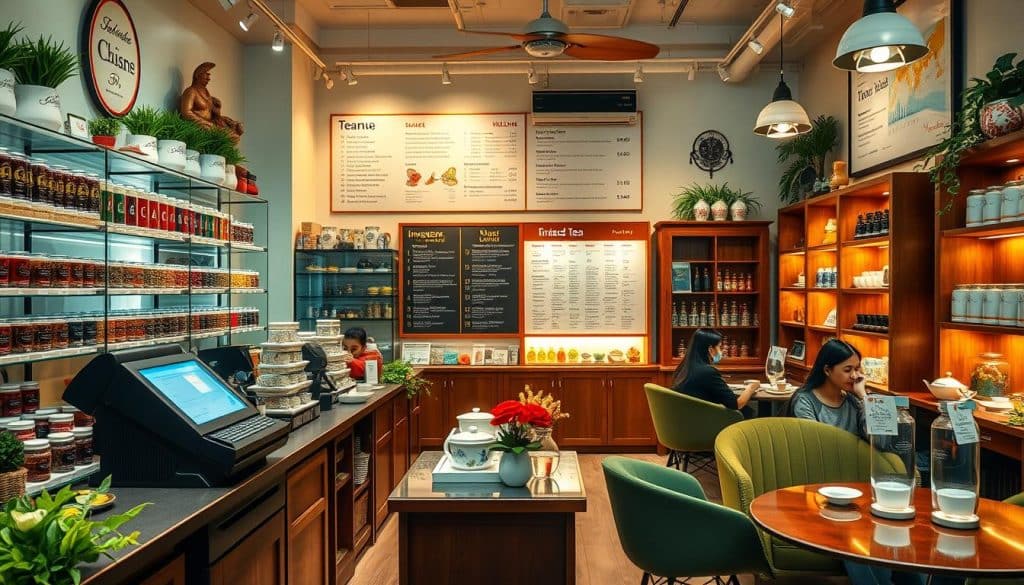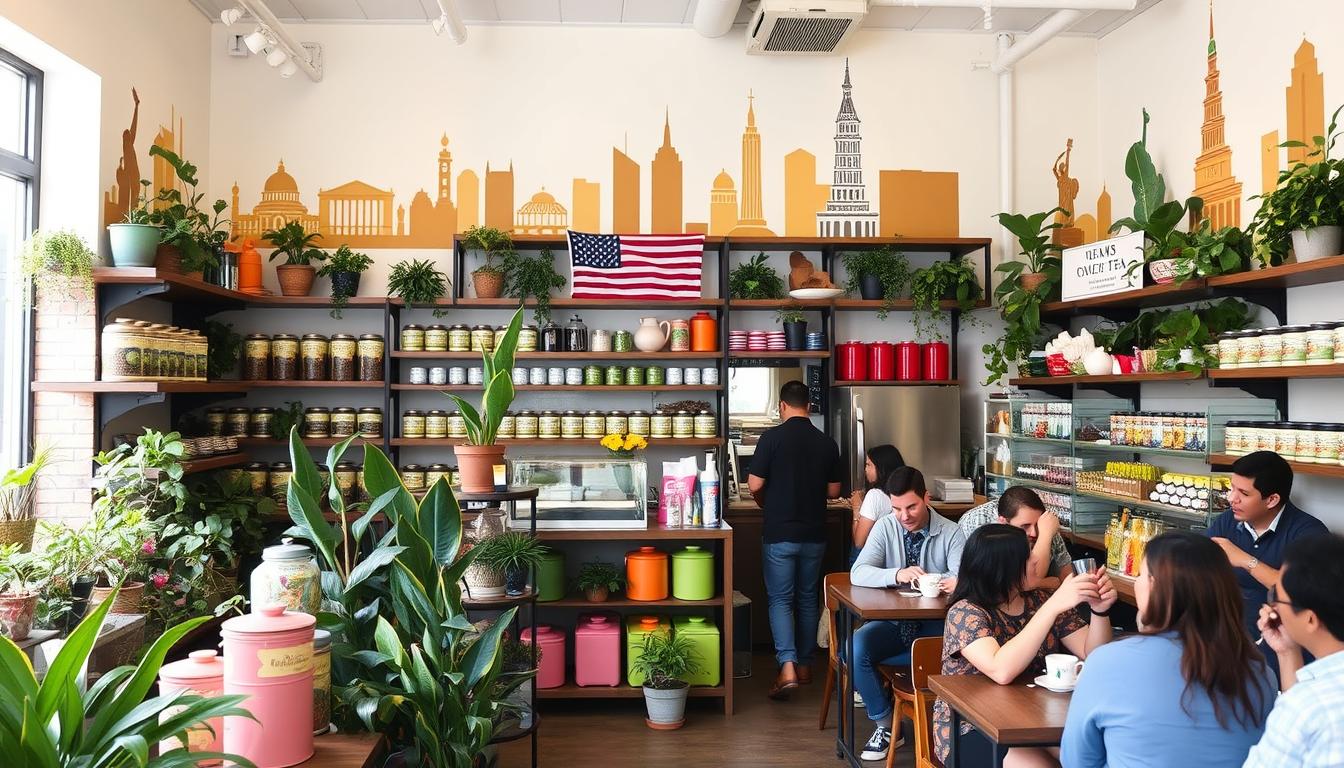Are you ready to dive into a market where demand for tea franchises is skyrocketing? Tea is the second most consumed beverage globally. It’s increasingly popular in America, making it a great opportunity for entrepreneurs. The U.S. is the world’s top tea importer, making it a perfect place to start a tea business.
This article is your guide to starting a tea franchise. It covers key things to think about and the exciting possibilities in this sector.
Key Takeaways
- Tea is the second most consumed beverage worldwide.
- The U.S. is the leading importer of tea, fueling franchise growth.
- Successful franchises like Tiger Sugar and HeyTea expand rapidly.
- Understanding the initial investment costs is key for franchisees.
- There are many tea franchise models to choose from, each with its own entry point.
The Rise of the Tea Industry in America
The tea industry in the United States is growing fast. This growth shows how people’s tastes and health concerns are changing. More people are trying different teas, leading to a big demand for them.
This boom is seen in the rise of bubble tea and specialty teas. It opens up new chances for those who want to start a franchise.
Market Growth Trends
The global bubble tea market was worth $2.46 billion in 2023. It’s expected to jump to $4.78 billion by 2032. This shows a big increase in interest for new flavors and drinks.
Brands like Gong cha aim to open 5,000 stores worldwide. This shows how fast the market is changing. Krak Boba, with 28 locations in eight states, also shows the growth.
Popular Tea Varieties
Tea choices are changing, with more people looking for healthy options. Green and black tea are popular, but matcha and bubble tea are becoming favorites too. Brands are now creating many different drinks.
Gong cha has around 600 drink options, including seasonal flavors like Strawberry Almond Jelly Smoothie. Krak Boba’s new drinks, like Cocoberry and Matcha Prince, show the fun side of the industry.
Consumer Preferences
Today, people want high-quality and unique tea experiences. This change is making tea franchises offer more organic and natural drinks. They need to meet these health-focused tastes.
Working with well-known brands, like Gong cha’s partnerships, helps attract more customers. It also builds loyalty among them.
Benefits of Joining a Tea Franchise
Joining a tea franchise comes with many benefits that can boost your business. One big plus is the brand recognition from names like Joseph’s Tea Room and Li Cha Tea. These brands offer a trusted name, helping you win over customers right away.
Brand Recognition
Brand recognition is key for tea franchises. Joseph’s Tea Room, for example, has been named Best of the Best by Tampa Bay Times every year. This shows its strong position in the market. With such a well-known brand, you can draw in a dedicated customer base.
Support and Training
Getting the right support is vital for new business owners. Joseph’s Tea Room and Li Cha Tea provide detailed training. They teach everything from marketing to daily operations. This support continues, helping you overcome any hurdles.
Flexibility and Scalability
Franchisees can adjust their services as needed, thanks to scalable opportunities. You can start small and grow as demand increases. This adaptability is perfect for tapping into the health-conscious market. With more people looking for tea’s benefits, now is a great time to join.
Top Tea Franchise Brands to Consider
The tea industry is booming in the United States. Several brands have become major players. Each brand has unique features that attract different customers and investors. Here are some top tea franchises to look at.
Teavana
Teavana is known for its high-quality teas and unique blends. It focuses on quality and innovation, drawing in customers who want the best. Franchisees get a well-known brand and marketing help to grow their business.
Teavana is all about freshness and connecting with customers. This means franchise owners can expect their sales to grow.
David’s Tea
David’s Tea is all about creative tea blends. It offers a fun shopping experience, drawing in customers. The brand also cares about the environment, which appeals to many.
David’s Tea uses smart marketing and focuses on quality. This makes it a top choice in the tea market.
Bubble Tea Franchise Opportunities
Bubble tea is very popular, with brands like Kung Fu Tea leading the way. Kung Fu Tea has 380 locations in the U.S. and specializes in custom drinks. It attracts young people.
Starting a Kung Fu Tea franchise costs between $169,000 and $378,000. It’s a good investment, with lots of customers and a 12% annual growth rate. The brand is also big on social media, which helps attract more customers.
Investment Costs Involved in Tea Franchising
For those looking to start a tea franchise, knowing the costs is key. There are several expenses, from the initial fees to ongoing operational costs. Each cost is important in deciding if a tea franchise is a good investment.
Initial Franchise Fees
The cost to start a tea franchise varies by brand. For example, MTea & Coffee charges a $30,000 fee. This fee helps with staff training and getting the business open. Sharetea, on the other hand, requires an investment of $296,000 to $502,000. Franchisees need $100,000 to $150,000 in liquid assets.
Equipment and Licensing Costs
Franchise owners must budget for equipment and licensing. This includes brewing machines and furniture. They also need to consider local permits. For MTea & Coffee, owners must pay staff salaries and benefits too.
Operational Expenses
Operational costs are a big part of a tea franchise’s success. These include rent, wages, inventory, and marketing. For example, Teahouse Tapioca and Tea charge 5% to 7% of sales as royalties. This shows the need for careful financial planning to keep the business going.

Ideal Locations for Tea Franchises
Choosing the right location is key for any tea franchise. Urban, suburban, and high-traffic areas all play a part. Understanding who might visit your tea shop is important.
Look at the age, income, and lifestyle of the area. This helps find places where tea lovers and health fans are likely to be.
Urban vs. Suburban Settings
Urban areas draw in a wide range of people, like students and professionals. They have lots of foot traffic because of shopping and entertainment. Suburban spots, near schools or homes, build a loyal customer base.
Each area has its own unique appeal. It’s important to think about who lives and works there.
High Traffic Areas
High-traffic spots are great for visibility. Shopping areas, busy streets, and college campuses get lots of people. Knowing when these spots are busiest helps attract more customers.
Being in these lively places can bring in new faces. It’s a chance to show off your brand.
Nearby Competitors
Knowing who else is around is important. Tea shops and cafés can be both a challenge and an opportunity. Working with local businesses can help you understand the area better.
It’s about finding your place in the market. This helps you stand out and attract customers.
Brands like ShareTea show the power of good location choices. They’re always looking to improve their spots. For those starting a tea franchise, getting advice from experts is a big help.
Visit ShareTea’s franchise opportunities to learn more about starting your own.
Franchise Model Types in the Tea Sector
The tea industry has many franchise models. Each one meets different needs and tastes. Knowing these options helps you pick the best fit for your goals. You can choose from tea cafés, delivery services, or retail shops.
Full-Service Cafés
Full-service tea cafés offer a welcoming place for tea lovers. They serve a wide range of teas with light meals and snacks. These cafés focus on making customers happy, encouraging them to stay and chat.
They build a loyal customer base with their cozy feel and great service. Starting one can cost a lot, but they make more money and have loyal customers.
Take-Out and Delivery Services
Take-out and delivery services are big hits with today’s fast-paced lives. They let customers order teas online or through apps and get them quickly. To run these services, you need a good system for delivering fresh tea.
Franchise owners in this area save on costs because they don’t need big spaces. They make more money by delivering teas.
Retail Tea Shops
Retail tea shops sell loose-leaf teas, accessories, and gifts. They offer tastings and classes, which are great for tea lovers. These shops attract people looking for quality tea products.
Starting a retail tea shop might cost less than a café. But, they can build a loyal customer base. Owners get support from the franchise network, helping their business grow.
Understanding Tea Franchise Agreements
It’s key for those interested in tea franchises to understand the agreements. These agreements outline the tea franchise terms that define the relationship between the franchisor and franchisee. They cover financial duties, how to run the business, and support services.
Knowing these details helps owners manage their businesses well. It also helps them avoid risks that come with running a franchise.
Key Terms and Conditions
When diving into a franchise agreement, start with the key terms and conditions. These include things like royalties, advertising fees, and where you can operate. Each franchisor has its own set of rules that can impact how you run your business and profits.
Understanding these terms helps both sides know what to expect. It’s important for a successful franchise relationship.
Duration of Franchise Agreements
How long a franchise agreement lasts varies. They can be from 5 to 20 years, with options to renew. This gives franchisees time to grow and expand their businesses.
Knowing how long you’re committed helps with planning for the future. It’s a key part of a successful franchise.
Exit Strategies and Renewal Options
Renewing your franchise agreement is important for keeping your business strong. Make sure you know how to renew your contract. Also, having a clear plan for leaving the business is essential.
It lets you make smart choices if you want to move on. Planning for franchise renewal options is important for your business’s health and future.
Marketing Strategies for Tea Franchises
Marketing is key for tea franchises to thrive. Mixing old-school tactics with new digital methods boosts visibility and loyalty. Local ads, community events, and fun promotions are vital for a strong presence.
Traditional Marketing Tactics
Traditional methods like flyers and local ads reach people directly. Joining local fairs and festivals raises brand awareness and connects with the community. This builds trust and encourages people to try the brand.
Digital Marketing Approaches
Digital marketing is a must for tea franchises. Social media and content marketing reach more people. Engaging visuals and blog posts attract younger customers. Targeted ads improve ROI, drawing in the right customers.
Community Engagement
Engaging with the community boosts a franchise’s image and builds loyal customers. Hosting tea tastings, workshops, or seasonal events creates local ties. These events attract visitors and turn them into brand supporters.

Challenges Faced by Tea Franchise Owners
Starting a tea franchise comes with its own set of challenges. One big hurdle is the fierce competition in the beverage market. With so many options like coffee, soda, and health drinks, it’s hard to stand out. Owners must find unique ways to attract customers and offer memorable experiences.
Competition from Other Beverages
Supply chain issues also pose a problem. Delays in shipping and finding quality ingredients can hurt sales. Franchisees need strong supplier relationships and good inventory management to overcome these issues.
Supply Chain Limitations
Keeping quality and consistency across all locations is key for success. If brewing techniques or ingredient quality vary, it can upset customers. Owners should focus on training and regular checks to maintain their brand’s standards. With the right strategies, franchisees can succeed in the dynamic tea market.





